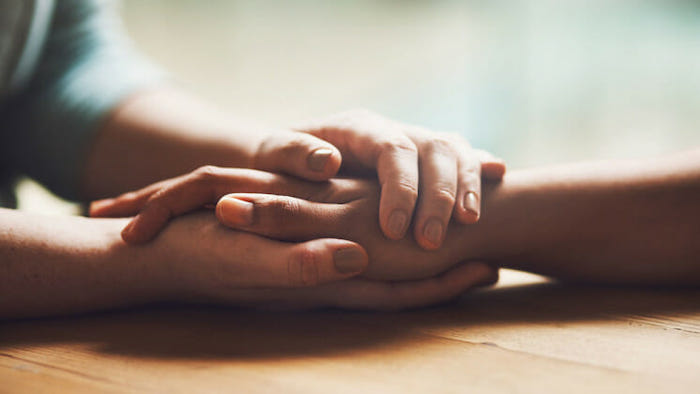When it comes to being helpful, actions can speak louder than words
When trying to provide help or comfort to someone who has recently lost a loved one, we’re likely to agonize over the right thing to say.
Sometimes the best way to help isn’t to say anything at all, but to do something specific that is supportive and meaningful.
Offers of support can be open-ended and vague, and often the last thing a grieving person wants to do is devote effort to an ambiguous offer of food or company.
Knowing the best way to lend a hand can be difficult, but it shouldn’t stop you from trying.
With that in mind, Considerable spoke to experts in the field of grief and trauma recovery, who helped us create this list of 6 thoughtful actions to do when someone has passed away.
1. Be present and be persistent
Many folks experiencing a loss receive an abundance of attention and help in the direct aftermath of a death, only to encounter a substantial drop-off in communication as the weeks pass by. That follow-up period is an important time to remain available to the bereaved.
Dea Dean, family therapist and licensed professional counselor in Ridgeland, Mississippi, emphasized the importance of staying in touch after the initial period of shock following the death and funeral.
Dean recommends not leaving plans open-ended. “Set a reminder in your phone once a week to text,” she said, “and ask to fulfill a specific need.”
And if that offer gets turned down, don’t get discouraged. “Offer to pick up your friend and take them somewhere and let them know you’ll continue to ask. Don’t stop offering and inviting if they decline. Keep pursuing them,” Dean said.
Kriss Kevorkian, PhD. MSW, an expert in grief, death, and dying, agrees: “Continue to be available and present for the bereaved. Keep in touch week after week as best you can. In all these actions, please make sure not to take over the conversation.
“Just be present, loving and your authentic self in compassion to another,” Kevorkian continued. “Most people want to have someone check in and visit.”
2. Help around the house
There’s no shortage of chores and small tasks that can be of great assistance. You can grocery shop; help with the laundry; clean closets, cellars, and attics; care for pets; or do yard work.
In addition, think about simple ways you can offer relief to the grieving person that aren’t cooking and cleaning.
Are they planning on sending thank-you notes to people who attended the funeral service? Consider buying them the cards and stamping them.
Dealing with the legal documents that follow a death can also be a huge hassle for the bereaved.
If you have skills in this department, help the mourner organize the task, make lists of people to call or meet with, and look up addresses online.
3. Get them out of the house
Being physically active and connecting with nature can be a great way to help ease feelings of isolation and sadness. A long walk in the fresh air can be revitalizing, or if there’s a specific game or activity (tennis, bowling, swimming) you have done with the person in the past, try that.
Just as constructive: Bring them to a coffee shop or museum. And if they aren’t feeling it, no big deal.
Dean said, “Let them know they don’t have to hide how they’re feeling and that you’re open to staying out or going home at their leisure.”
4. Memorialize the deceased
Helping to commemorate the deceased, whether individually or collaborative with others, is a thoughtful gesture that can help evoke positive memories for the mourner.
Whether it’s a piece of art, a poem, or a framed photograph, showing you care with a creative work is an extremely nice gesture.
Also consider making a charitable donation in the name of the deceased.
5. Avoid bringing food and flowers
Think outside the box. Bringing food and flowers is a thoughtful gesture, and of course providing food can be especially helpful as someone deals with a traumatic loss and lacks the time and energy to cook.
But Sherry Cormier, licensed psychologist and a certified bereavement trauma specialist in Annapolis, Maryland, offers this advice: “Be very careful about the ‘usual suspects’ given to grievers, e.g. food and flowers. Some people are allergic to flowers and flowers die and have to be cared for at a time when grievers don’t feel like caring for anything. Often grief survivors are inundated with food and end up throwing food away. Also there is the issue of food allergies.”
Instead of bringing over a casserole, try paying for a meal service that can be used when the mourner really needs it.
And instead of flowers, try a gift card or a certificate for a massage.
6. Listen
“Listening is a huge gift,” Cormier said. “Grievers may need to talk and tell the story over and over to help them heal. If you can simply be present and listen and avoid being prescriptive, this is wonderful.”
Making yourself available while being patient and comfortable not having answers or the “right words” is important.
According to Dea, “If we give them the space to talk freely (without believing we have to take their pain away or do anything to fix it) it can bring them great relief.”
Dr. Kevorkian agrees: “The best action to take in this situation is to listen and not interrupt with your own story or judge what the other person is sharing.”
And as you consider the best ways of helping someone, make sure you cater to their personality and their needs. No two people grieve the same way or on the same timeline, so be flexible with both your time and your expectations.
Complete Article ↪HERE↩!

